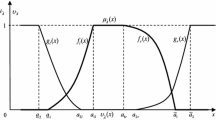Abstract
In this paper we study a class of linear programming problems having fuzzy goals/constraints that can be described by (Atanassov’s) I-fuzzy sets. Duality theory is developed for this class of problems in the I-fuzzy sense which is subsequently applied to define a new solution concept for two persons zero-sum matrix games with I-fuzzy goals.
Similar content being viewed by others
References
Angelov P. P. (1997) Optimization in an intuitionistic fuzzy environment. Fuzzy Sets and Systems 86: 299–306
Atanassov K. T. (1986) Intuitionistic fuzzy sets. Fuzzy Sets and Systems 20: 87–96
Atanassov K. T. (1989) More on intuitionistic fuzzy sets. Fuzzy Sets and Systems 33: 37–45
Atanassov K. T. (1994) New operations defined over the intuitionistic fuzzy sets. Fuzzy Sets and Systems 61: 137–142
Atanassov K. T. (1999) Intuitionistic fuzzy sets. Springer, Heidelberg
Bector C. R., Chandra S. (2002) On duality in linear programming under fuzzy environment. Fuzzy Sets and Systems 125: 317–325
Bector C. R., Chandra S. (2005) Fuzzy mathematical programming and fuzzy matrix games. Springer, Berlin
Bector C. R., Chandra S., Vidyottama V. (2004) Matrix games with fuzzy goals and fuzzy linear programming duality. Fuzzy Optimization and Decision Making 3: 255–269
Beliakov, G., Bustince, H., Goswami, D. P., Mukherjee, U. K., & Pal, N. R. (2010). On averaging operators for Atanassovs intuitionistic fuzzy sets. Information Sciences. doi:10.1016/j.ins.2010.11.024.
Bellman R. E., Zadeh L. A. (1970) Decision making in a fuzzy environment. Management Sciences 17: 141–164
Cevikel A. C., Ahlatçiogˇlu M. (2010) Solutions for fuzzy matrix games. Computers and Mathematics with Applications 60: 399–410
Compos L. (1989) Fuzzy linear programming models to solve fuzzy matrix games. Fuzzy Sets and Systems 32: 275–289
De S. K., Biswas R., Roy A. R. (2001) An application of intuitionistic fuzzy sets in medical diagnosis. Fuzzy Sets and Systems 117: 209–213
Deschrijver G., Cornelis C., Kerre E. E. (2004) On the representation of intuitionistic fuzzy t-norms and t-conorms. IEEE Transactions on Fuzzy Systems 12: 45–61
Dubois D., Gottwald S., Hajek P., Kacprzyk J., Prade H. (2005) Terminological difficulties in fuzzy set theory—The case of intuitionistic fuzzy sets. Fuzzy Sets and Systems 156: 485–491
Grzegorzewski P., MrÓwka E. (2005) Some notes on (Atanassov’s) multiobjective fuzzy sets. Fuzzy Sets and Systems 156: 492–495
Gupta P., Mehlawat M. K. (2009) Bector–Chandra type duality in fuzzy linear programming with exponential membership functions. Fuzzy Sets and Systems 160: 3290–3308
Kacher F., Larbani M. (2008) Existence of equilibrium solution for a non-cooperative game with fuzzy goals and parameters. Fuzzy Sets and Systems 159: 164–176
Li D. -F. (2005) Multiattribute decision making models and methods using intuitionistic fuzzy sets. Journal of Computer and System Sciences 70: 73–85
Li D. -F., Nan J. -X. (2009) A nonlinear programming approach to matrix games with payoffs of Atanassov’s intuitionistic fuzzy sets. International Journal of Uncertainty, Fuzziness and Knowledge-Based Systems 17: 585–607
Mahdavi-Amiri N., Nasseri S. H. (2006) Duality in fuzzy number linear programming by use of certain linear ranking function. Applied Mathematics and Computation 180: 206–216
Nan, J., Li, D. -F., & Zhang, M. (2009). The linear programming approach to matrix games with payoffs of intuitionistic fuzzy sets. In Second International Workshop on Computer Science and Engineering. doi:10.1109/WCSE.2009.258, pp. 603–607.
Nishizaki I., Sakawa M. (2001) Fuzzy and multiobjective games for conflict resolution. Physica-Verleg, Heidelberg
Peng, Z., Dagang, L., & Guangyuan, W., Idea and principle of intuitionistic fuzzy optimization. http://www.paper.edu.cn.
Ramik J. (2005) Duality in fuzzy linear programming: Some new concepts and results. Fuzzy Optimization and Decision Making 4: 25–39
Szmidt E., Kacprzyk J. (1996) Remarks on some application of intuitionistic fuzzy sets in decision making. Notes on IFS 2: 2–31
Vijay V., Chandra S., Bector C. R. (2005) Matrix games with fuzzy goals and fuzzy payoffs. Omega 33: 425–429
Vlachos I. K., Sergiadis G. D. (2007) Intuitionistic fuzzy information—Applications to pattern recognition. Pattern Recognition Letters 28: 197–206
Wu H. C. (2003) Duality theory in fuzzy linear programming problems with fuzzy coefficients. Fuzzy Optimization and Decision Making 2: 61–73
Yager R. (2009) OWA aggregation of intuitionistic fuzzy sets. International Journal of General Systems 38: 617–641
Zimmermann H. -J. (1991) Fuzzy set theory and its applications. Kluwer, Dordrecht
Author information
Authors and Affiliations
Corresponding author
Rights and permissions
About this article
Cite this article
Aggarwal, A., Mehra, A. & Chandra, S. Application of linear programming with I-fuzzy sets to matrix games with I-fuzzy goals. Fuzzy Optim Decis Making 11, 465–480 (2012). https://doi.org/10.1007/s10700-012-9123-z
Published:
Issue Date:
DOI: https://doi.org/10.1007/s10700-012-9123-z




